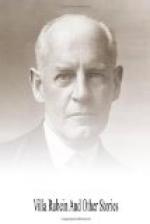Lifting the motionless Sarelli as if he were a baby, she laid him on a couch.
“Ah!” she said, sitting down and resting her elbow on the table; “he will not wake!”
Harz bowed to her; her patient figure, in spite of its youth and strength, seemed to him pathetic. Taking up his knapsack, he went out.
The smoke of cottages rose straight; wisps of mist were wandering about the valley, and the songs of birds dropping like blessings. All over the grass the spiders had spun a sea of threads that bent and quivered to the pressure of the air, like fairy tight-ropes.
All that day he tramped.
Blacksmiths, tall stout men with knotted muscles, sleepy eyes, and great fair beards, came out of their forges to stretch and wipe their brows, and stare at him.
Teams of white oxen, waiting to be harnessed, lashed their tails against their flanks, moving their heads slowly from side to side in the heat. Old women at chalet doors blinked and knitted.
The white houses, with gaping caves of storage under the roofs, the red church spire, the clinking of hammers in the forges, the slow stamping of oxen-all spoke of sleepy toil, without ideas or ambition. Harz knew it all too well; like the earth’s odour, it belonged to him, as Sarelli had said.
Towards sunset coming to a copse of larches, he sat down to rest. It was very still, but for the tinkle of cowbells, and, from somewhere in the distance, the sound of dropping logs.
Two barefooted little boys came from the wood, marching earnestly along, and looking at Harz as if he were a monster. Once past him, they began to run.
‘At their age,’ he thought, ‘I should have done the same.’ A hundred memories rushed into his mind.
He looked down at the village straggling below—white houses with russet tiles and crowns of smoke, vineyards where the young leaves were beginning to unfold, the red-capped spire, a thread of bubbling stream, an old stone cross. He had been fourteen years struggling up from all this; and now just as he had breathing space, and the time to give himself wholly to his work—this weakness was upon him! Better, a thousand times, to give her up!
In a house or two lights began to wink; the scent of wood smoke reached him, the distant chimes of bells, the burring of a stream.
IX
Next day his one thought was to get back to work. He arrived at the studio in the afternoon, and, laying in provisions, barricaded the lower door. For three days he did not go out; on the fourth day he went to Villa Rubein....
Schloss Runkelstein—grey, blind, strengthless—still keeps the valley. The windows which once, like eyes, watched men and horses creeping through the snow, braved the splutter of guns and the gleam of torches, are now holes for the birds to nest in. Tangled creepers have spread to the very summits of the walls. In the keep, instead of grim men in armour, there is a wooden board recording the history of the castle and instructing visitors on the subject of refreshments. Only at night, when the cold moon blanches everything, the castle stands like the grim ghost of its old self, high above the river.




